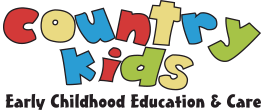Country Kids had a great review from the Education Review Office (ERO) in February 2019.
Click here to view our latest full report.
Below are some of the reviews findings…

Country Kids Childcare Centre
Upper Moutere, Nelson – 26 February 2019
Evaluation of Country Kids Childcare Centre
How well placed is Country Kids Childcare Centre to promote positive learning outcomes for children?
Not well placed – Requires further development – Well placed – Very well placed
ERO’s findings that support this overall judgement are summarised below.
Background
Country Kids Childcare Centre is a not for profit, community-owned and operated centre in rural Nelson. It is licensed for a maximum of 50 children, including up to nine under two-year olds. It is governed by a parent/community board. There is a centre manager, curriculum leader and financial officer, all providing leadership. All teachers have early learning education qualifications. Centre staffing is stable and experienced. The centre operates full-day sessions from Monday to Friday. Children from a wide geographical area attend the centre. Recent enrolments have increased the cultural diversity at the centre.
The centre is divided into three areas according to age, under two-year olds, two-to-four year olds, and four-to-five year olds. Transitions from room to room are flexible and depend on children’s readiness for change.
The centre philosophy incorporates the following:
- cooperative play
- provision of a rich curriculum that fosters curiosity and inquiry
- the importance of building meaningful relationships based on trust, respect and honesty
- caring for children’s mana, respect for people and the environment
- respecting and celebrating the Treaty of Waitangi.
The centre has successfully addressed the recommendations from the 2015 ERO report. Some recommendations are still in progress. These include making centre priorities more manageable over time in the strategic plan, and continuing to build greater consistency across the team in assessment practices.
The Review Findings
The centre is welcoming to children, their parents/whānau and provides equitable opportunities for all to attend the centre. Relationships at all levels are very respectful, nurturing and warm and recognised as important foundations for learning. The collegial and collaborative nature of the staff contributes to best outcomes for children.
The expansive indoor and outside areas are a stimulus for a rich, broad curriculum. Teachers enhance this environment by providing activities that promote intellectual and physical challenge. The practices and desired outcomes outlined in the philosophy are highly evident in the programmes, interactions and environment. Leaders and teachers make very good use of outside agencies, expertise and community events to enrich children’s learning and engage families.
Te ao Māori is authentically integrated and interwoven throughout the programme. There is regular use of te reo Māori in all rooms and children are gaining an awareness of New Zealand’s bicultural heritage. This is helping Māori children achieve success as Māori in an environment where their language, culture and identity are valued.
Children under two years of age benefit from having a primary carer who provides:
- positive, responsive interactions leading to strong attachments and a sense of security
- for their changing routines and preferences, and uses these as opportunities for learning
- interesting resources and experiences to stimulate their engagement and learning.
The board and leaders very effectively govern and manage the day-to-day and long-term operations of the centre. Careful financial management has ensured the centre’s viability and sustainability. There is strong alignment of systems and processes that shows a shared purpose and direction.
The manager keeps the board well informed about the curriculum focus, centre events, the appraisal process and ongoing staff development. Leaders consistently model a caring, collaborative approach that promotes trusting relationships and upholds staff wellbeing. They support teachers to reflect on their practice and contribute to internal evaluation in a strong culture of ongoing improvement.
Key Next Steps
To strengthen the good practice already in action the leaders and ERO agree that the next important steps are to:
- refine the strategic plan to better reflect the centre’s priorities
- extend leaders’ and teachers’ understanding of evaluation and refine the process so that it is manageable
- build consistency in assessment practices across the teaching team to better show how teachers are extending children’s learning.
What parents are saying about us!


